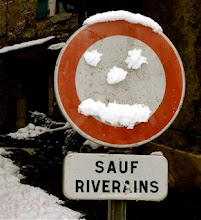


November- you wonder what happened to me? I was on vacation, but getting my fill of French. So there I am in Tokyo and it seems to me that every pâtisserie is French- or at least has a French name: Bon Dessert, St. Germain, La Pêche-Blanc...
There are ALOT of pâtisseries that also double as a café. On the other hand when I walk into cafés and ask for the menu- it's not uncommon to see the headers in English (Coffee, Soft Drink, Alcohol, Dessert) but that's it- then it's all Japanese. English is rarely spoken or "only little".
One day when I walked into to a café and asked what was on the menu and the owner responded with "gâteau" I seized my chance and asked "parlez-vous français?" The answer is the same blank look and a raising of the eyebrows I get when I ask "do you speak English?"
After two weeks, I'm undecided as to which language/culture the Japanese favor more: English or French.
My French experience in Tokyo was limited to the tasting of "gâteaux" and the interesting Japanese/French dessert fusions.
La photos:
1+2) Dessert at Ma Chatelaine in Shibuya with the explanation of what could be found inside the dessert.
3) Sweets for sale at the Bon Dessert in Seiyu/Nishi-Ogikubo Station.
Japon, Novembre 2009














